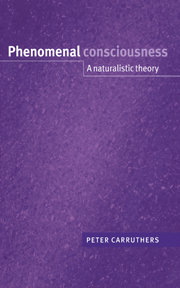Book contents
- Frontmatter
- Contents
- List of figures
- Preface
- 1 Assumptions, distinctions, and a map
- 2 Perspectival, subjective, and worldly facts
- 3 Explanatory gaps and qualia
- 4 Naturalisation and narrow content
- 5 First-order representationalism
- 6 Against first-order representationalism
- 7 Higher-order representationalism: a first defence
- 8 Dispositionalist higher-order thought theory (1): function
- 9 Dispositionalist higher-order thought theory (2): feel
- 10 Phenomenal consciousness and language
- 11 Fragmentary consciousness and the Cartesian theatre
- Conclusion
- References
- Author index
- Subject index
7 - Higher-order representationalism: a first defence
Published online by Cambridge University Press: 30 September 2009
- Frontmatter
- Contents
- List of figures
- Preface
- 1 Assumptions, distinctions, and a map
- 2 Perspectival, subjective, and worldly facts
- 3 Explanatory gaps and qualia
- 4 Naturalisation and narrow content
- 5 First-order representationalism
- 6 Against first-order representationalism
- 7 Higher-order representationalism: a first defence
- 8 Dispositionalist higher-order thought theory (1): function
- 9 Dispositionalist higher-order thought theory (2): feel
- 10 Phenomenal consciousness and language
- 11 Fragmentary consciousness and the Cartesian theatre
- Conclusion
- References
- Author index
- Subject index
Summary
In this chapter I shall take the first steps towards a defence of higher-order representational (HOR) accounts of phenomenal consciousness. I shall argue that these accounts have considerable explanatory advantages over first-order representational (FOR) theories, and that they have the resources to rebut a number of potentially-devastating objections.
Overview and preliminaries
The difficulties which attach to first-order (FOR) theories (discussed in chapter 6), together with the implausibility of explaining phenomenal consciousness directly in neurological terms (see chapters 3 and 4), give us some reason to think that the truth might lie in the area of HOR theory. But it is time, now, to give explicit consideration to the strengths and weaknesses of a HOR approach. Recall from chapter 1:4 that there are four salient forms of HOR theory of phenomenal consciousness which we need to consider – higher-order experience (HOE) theory, actualist higher-order thought (HOT) theory, dispositionalist HOT theory, and higher-order linguistic description (HOD) theory.
There are a number of respects in which HOR theories can be treated en masse, since some of the strengths of any given HOR theory are equally strengths attaching to all; and since some of the objections which can be levelled against any particular form of HOR theory can equally be levelled against all. But in other respects the various forms of HOR theory need to be assessed individually, since there are considerations which work in favour of some HOR theories but not others, and there are difficulties for some HOR theories which are not difficulties for others.
- Type
- Chapter
- Information
- Phenomenal ConsciousnessA Naturalistic Theory, pp. 180 - 209Publisher: Cambridge University PressPrint publication year: 2000



